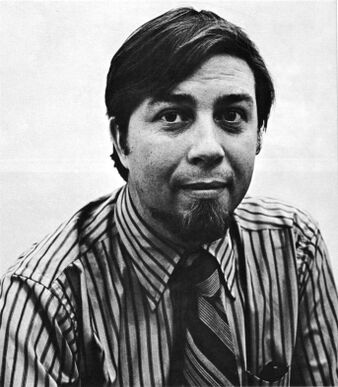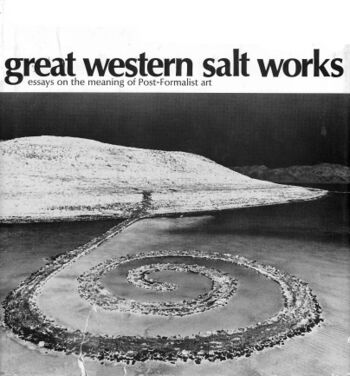Jack Burnham
 Photo from the Software catalogue, 1970. | |
| Born |
November 13, 1931 New York City, New York |
|---|---|
| Died |
February 25, 2019 (aged 87) New York |
| Web | Aaaaarg, Wikipedia, Academia.edu |
Jack Wesley Burnham Jr. (1931-2019) was an American writer on art and technology, who taught art history at Northwestern University and the University of Maryland. He was one of the main forces behind the emergence of systems art in the 1960s.
Biographical note[edit]
This section is based on Edward A. Shanken, "The House That Jack Built", Leonardo Electronic Almanac 6:10 (Nov 1998).
Burnham was born 1931 in New York City and grew up in Quincy, Massachusetts. He studied at the Boston Museum School and the Wentworth Institute before graduating from the Yale School of Art with a BFA in 1959 and an MFA in 1961. From 1956 to 1968, he worked intermittently as a signpainter and draftsman, but sculpture was his main focus, often including light (incandescent bulbs, neon, etc.; a photo of a ceiling-mounted piece from 1968, made of electro-luminescent tape and aluminum channels, appears in Beyond Modern Sculpture). He was a Fellow at MIT's Center for Advanced Visual Studies in 1968-9 and won a Guggenheim Fellowship in 1973-4 to work on a book about Marcel Duchamp.
His first book, Beyond Modern Sculpture: The Effects of Science and Technology on the Sculpture of Our Time, 1968, established him as the pre-eminent champion of art and technology of his generation. Building on this foundation, his second book, The Structure of Art, 1971, developed one of the first systematic methods for applying structural analysis to the interpretation of individual artworks as well as to the canon of western art history itself. In his articles "Systems Esthetics" (1968) and "Real Time Systems" (1969), Burnham already explored a systems approach to art: "A systems viewpoint is focused on the creation of stable, ongoing relationships between organic and non-organic systems". Many of his articles for Arts Magazine from 1968-70, where he was Associate Editor (1972-76) and Artforum from 1971-3, where he was Contributing Editor (1971-2), were collected in his third book, The Great Western Salt Works, 1973. These essays still remain amongst the most insightful commentaries on conceptual art, already suggesting what he now sees in retrospect as the "great hiatus between standard modernism and postmodernism".
In 1970, at the invitation of Jewish Museum director, Karl Katz, Burnham curated Software - Information Technology: Its New Meaning for Art, the only major show he has curated to date. In contrast to the numerous art and technology exhibitions which took place between 1966-1972, and which focused on the aesthetic applications of technological apparatus, Software was predicated on the ideas of "software" and "information technology" as metaphors for art. He conceived of "software" as parallel to the aesthetic principles, concepts, or programs that underlie the formal embodiment of the actual art objects, which in turn parallel "hardware". In this regard, he interpreted "Post-Formalist Art" (his term referring to experimental art practices including performance, interactive art, and especially conceptual art) as predominantly concerned with the software aspect of aesthetic production.
During his most prolific period as a writer, he taught art history at Northwestern University in Illinois, eventually becoming chairman of the art department in 1976. Later he taught at the University of California at San Diego, the School of the Art Institute of Chicago, Colgate University, and Williams College. In the 1980s he moved to the University of Maryland (College Park campus) and again chaired the art and art history departments. Retired, he lived in Hyattsville, Maryland, immersed in Kabbalah.
Publications[edit]
Books[edit]
- Beyond Modern Sculpture: The Effects of Science and Technology on the Sculpture of This Century, New York: George Braziller, 1968, 416 pp, PDF, IA, IA, IA; London: Allen Lane, 1968.
- Art in the Marcusean Analysis, University Park: Pennsylvania State University Press, 1969.
- The Structure of Art, New York: G. Braziller, 1971; rev.ed., 1973, 195 pp, PDF.
- Kunst und Strukturalismus: die neue Methode der Kunst-Interpretation, trans. Wilhelm Höck, Cologne: DuMont Schauberg, 1973. Review: Gerhard Charles Rump (kritische berichte). (German)
- The Great Western Salt Works: Essays on the Meaning of Post-Formalist Art, New York: G. Braziller, 1974, 167 pp, PDF.
- Dissolve into Comprehension: Writings and Interviews, 1964-2004, ed. Melissa Ragain, forew. Hans Haacke, MIT Press, 2015, 352 pp. Publisher.
Essays[edit]
- "Sculpture, Systems and Catastrophy", Prologue, Winter 1966.
- "Sculpture's Vanishing Base", Artforum 6:3, Nov 1967, pp 47-55.
- "The Future of Responsive Systems in Art", in Burnham, Beyond Modern Sculpture, New York: G. Braziller, 1968.
- "Systems Esthetics", Artforum 7:1, Sep 1968, pp 30-35, HTML; repr. in Burnham, Great Western Salt Works, 1974, pp 15-25; repr. in Systems, ed. Edward Shanken, 2015.
- "Systémová estetika", trans. Lenka Dolanová, c2012. (Czech)
- "Esthétique des systèmes", trans. Franck Lemonde, in Jack Burnham and Hans Haacke, Esthétique des systèmes, ed. & pref. Emanuele Quinz, postf. Caroline A. Jones, Paris: Les presses du réel, 2015. [1] (French)
- "Systems and Art", Arts in Society 6(2): "Confrontation Between Art and Technology", University of Wisconsin, Summer/Fall 1969, pp 194-204.
- "Real Time Systems", Artforum 8:1, Sep 1969, pp 49-55; repr. in Burnham, Great Western Salt Works, 1974, pp 27-38.
- trans. Franck Lemonde, in Jack Burnham and Hans Haacke, Esthétique des systèmes, ed. & pref. Emanuele Quinz, postf. Caroline A. Jones, Paris: Les presses du réel, 2015. [2] (French)
- "The Aesthetics of Intelligent Systems", in On the Future of Art, ed. Edward F. Fry, New York: Viking Press, 1970, pp 95-122, PDF, IA. Presented in 1969 as a talk within the lectures series The Future of Art at the Solomon Guggenheim Museum in New York.
- "Alice’s Head: Reflections on Conceptual Art", Artforum 8:6, Feb 1970, pp 37-43; repr. in Burnham, Great Western Salt Works, 1974, pp 47-61; repr. in Conceptual Art: A Critical Anthology, eds. Alexander Alberro and Blake Stimson, MIT Press, 1999, pp 216-219.
- "Les Levine: Business as Usual", Artforum 8:8, Apr 1970, pp 40-43; repr. in Burnham, The Great Western Salt Works, 1974, pp 39-46. [3]
- "Notes on Art and Information Processing", in [http://monoskop.org/log/?p=5886 Software: Information Technology: Its New Meaning for Art, New York: Jewish Museum, 1970, pp 10-14.
- "Unveiling the Consort", part 1, Artforum 9:7, Mar 1971, pp 55-60; part 2, Artforum 9:8, Apr 1971, pp 42-51.
- "Hans Haacke’s Cancelled Show at the Guggenheim", Artforum 9:10, 1971, pp 67–71.
- "Duchamp's Bride Stripped Bare: The Meaning of the Large Glass", Arts Magazine, Mar-May 1972. Large Glass (1915-22) served as an architectural model for the installation of Burnham's exhibition Software.
- "Objects and Ritual: Towards a Working Ontology of Art", Arts Magazine 47:4, Dec 1972-Jan 1973, pp 28-32; repr. in Burnham, The Great Western Salt Works, 1974, pp 147-157.
- "Contemporary Ritual: A Search for Meaning in Post-Historical Terms", Arts Magazine 47:7, Mar 1973, pp 38-41; repr. in Burnham, The Great Western Salt Works, 1974, pp 159-167.
- "Steps in the Formulation of Real-Time Political Art", in Hans Haacke. Framing and Being Framed: 7 Works 1970-75, Halifax: The Press of the Nova Scotia College of Art and Design, and New York: New York University Press, 1975, pp 127-143.
- "Art and Technology: The Panacea That Failed", in The Myths of Information: Technology and Postindustrial Culture, ed. Kathleen Woodward, Madison, WI: Coda Press, 1980; repr. in Video Culture: A Critical Investigation, ed. John Hanhardt, Rochester, NY: Visual Studies Workshop Press, 1986.
- 'The Systems Approach", in Margaretha J.M. Bijvoet, Art as Inquiry, New York: Peter Lang, 1997, pp 67-74.
Interviews[edit]
- "Jack Burnham, Terry Fenton: An Exchange", Artforum 7:8, 1969, pp 60–61.
- "Willoughby Sharp Interviews Jack Burnham", Arts magazine 45:2, Nov 1970, pp 21-23; repr. in Burnham, Great Western Salt Works, 1974, pp 63-69.
Literature[edit]
- Marga Bijvoet, "Art as a Set of Relations", ch. 3 in Bijvoet, Art As Inquiry: Toward New Collaborations Between Art, Science, and Technology, Peter Lang, 1997, PDF.
- "Die Kunst der Bezugsgruppe", ch. 3 in Bijvoet, Kunst-Forschung, n.d. (German)
- Edward A. Shanken, "The House That Jack Built: Jack Burnham's Concept of Software as a Metaphor for Art", Leonardo Electronic Almanac 6:10, Nov 1998; repr. in Reframing Consciousness: Art, Mind and Technology, ed. Roy Ascott, Exeter, UK: Intellect Books, 1999, pp 156-160; rev. as "In Forming Software: Software, Structuralism, Dematerialization", in Mainframe Experimentalism: Early Computing and the Foundations of the Digital Arts, eds. Douglas Kahn and Hannah Higgins, Berkeley, CA: University of California Press, 2012, pp 51-60, PDF; rev. as "In Forming Software: Software, Structuralism, Demythification", Icono 12:2, 2014, pp 9-28.
- Simon Penny, "Systems Aesthetics + Cyborg Art: The Legacy of Jack Burnham", Sculpture 18:1, Jan/Feb 1999. [4]
- Matthew Rampley, "Systems Aesthetics: Burnham and Others", Vector b 12, 2005.
- Luke Skrebowski, "All Systems Go: Recovering Jack Burnham's 'System Aesthetics'", Tate Papers, London: Tate, Spring 2006.
- Luke Skrebowski, Systems, Contexts, Relations: An Alternative Genealogy of Conceptual Art, London: Middlesex University, 2009, 337 pp. PhD thesis.
- Charissa Terranova, "Software: Jack Burnham and the Medium as System", in 100th ACSA Annual Meeting Proceedings, Digital Aptitudes, eds. Amy Murphy and Mark Goulthorpe, ACSA, 2012, pp 161-167. [5]
- Christina Chau, "Kinetic Systems: Jack Burnham and Hans Haacke", Contemporaneity: Historical Presence in Visual Culture 3, 2014, pp 62-76.
- Courtney Fiske, "Jack Burnham's 'Real Time': Sculpture as System, 1967-1969", Grey Room 65, Fall 2016, pp 62-87.
- Luke Skrebowski, "Jack Burnham Redux: The Obsolete in Reverse?", Grey Room 65, Fall 2016, pp 88-113. [6]
- Luke Skrebowski, "Jack Burnham, ZERO, and Art from Field to System", in Between the Viewer and the Work: Encounters in Space: Essays on ZERO Art, eds. ZERO foundation, Tiziana Caianiello, and Barbara Könches, Heidelberg: arthistoricum.net, 2019.


